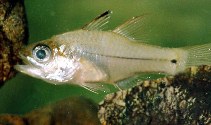| Family: |
Apogonidae (Cardinalfishes), subfamily: Apogoninae |
| Max. size: |
7 cm SL (male/unsexed) |
| Environment: |
reef-associated; freshwater; brackish; marine; depth range 2 - 5 m |
| Distribution: |
Indo-West Pacific: Zanzibar (Tanzania) eastward to Southeast Asia, and north to Amami-ôshima (Japan) southward to Taiwan, Palau, Philippines and New Guinea east to the Solomon Island and New Caledonia. |
| Diagnosis: |
Dorsal spines (total): 7-7; Dorsal soft rays (total): 9-9; Anal spines: 2-2; Anal soft rays: 8-8. Distinguished by having the following characteristics: dorsal-fin rays VI-I, 9; anal-fin rays II, 8; pectoral-fin rays 14; pelvic-fin rays I, 5; pored lateral-line scales 24; predorsal scales 7; circumpeduncular scales 12; total gill rakers 21-22, developed gill rakers 19-20; light brown body; two black stripes, one from snout to opercular margin through eye, and the second one on anterior portion of lateral line; blackish anterior part of first dorsal fin; base of caudal-fin with distinct black spot (Ref. 93839). |
| Biology: |
Found in brackish water at river mouths and among the mangroves. Also enters freshwater during low tide. Mouth brooding by males (Ref. 559). |
| IUCN Red List Status: |
Data deficient (DD); Date assessed: 15 August 2011 Ref. (130435)
|
| Threat to humans: |
harmless |
Source and more info: www.fishbase.org. For personal, classroom, and other internal use only. Not for publication.
